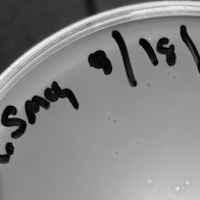| Detailed Information for Phage KingPhillip3 | |
| Discovery Information | |
| Isolation Host | Mycobacterium smegmatis mc²155 |
| Found By | Robert Sottile |
| Year Found | 2018 |
| Location Found | Las Vegas, NV USA |
| Finding Institution | University of Nevada Las Vegas |
| Program | Science Education Alliance-Phage Hunters Advancing Genomics and Evolutionary Science |
| From enriched soil sample? | Yes |
| Isolation Temperature | 29°C |
| GPS Coordinates | 36.107222 N, 115.143333 W Map |
| Discovery Notes | The soil sample from which this phage was isolated was taken from planter bed 24 at the UNLV recycling and composting center located at the above GPS coordinates taken via iPhone. The local air temperature reported by the NWS located at McCarran International Airport less than one mile from the above location was 85 degrees F. Soil conditions were moist even though local humidity was extremely low due to drip irrigation. The soil was damp but not saturated and clumped together when compressed. The sample was taken between 5 and 10 cm beneath the surface and secured in a plastic bag for transport to the lab. |
| Naming Notes | The initial agar plates created with unenriched lysates from this soil sample produced a few suspicious spots, but when each spot was independently plated, no further phage activity was noted. A name was assigned to each potential plaque, one of these being "Phil." When an enriched sample soil sample was prepared and identically plated, after incubation the entire bacterial population was lysed. Thus, this new phage was named "King Phillip III," for his regal performance eliminating M. Smegmatis. |
| Sequencing Information | |
| Sequencing Complete? | Yes |
| Date Sequencing Completed | Jan 28, 2025 |
| Sequencing Facility | NC State Genomic Sciences Laboratory |
| Shotgun Sequencing Method | Illumina |
| Sequencer Used | Illumina MiSeq |
| Read Type | Paired-end reads |
| Read Length | 150 bp |
| Approximate Shotgun Coverage | 65441 |
| Genome length (bp) | 71330 |
| Character of genome ends | 3' Sticky Overhang |
| Overhang Length | 4 bases |
| Overhang Sequence | GTCT |
| GC Content | 65.4% |
| Fasta file available? | Yes: Download fasta file |
| Characterization | |
| Cluster | O |
| Subcluster | -- |
| Cluster Life Cycle | Lytic |
| Other Cluster Members | |
| Annotating Institution | University of Nevada Las Vegas |
| Annotation Status | Being Annotated (Expected completion by 3/27/2026) |
| Plaque Notes | King Phillip III creates pin-point plaques when added to naive M. Semgmatis colonies. These tiny plaques tend to cluster and form larger areas of total clearing of approximately 1mm in diameter. The initial plaques have been estimated to be about half that diameter or smaller; the size is beyond the resolution of the measuring device. All plaques are completely clear; there is no evidence of lysogenic activity. At very low concentrations, a halo can be observed around the growing clustered plaques, but this seems to be the result of lower phage volume and not a temperate phage. Plaque morphology has been consistent since initial isolation. |
| Number of Genes | 122 |
| Number of tRNAs | 0 |
| Number of tmRNAs | 0 |
| Has been Phamerated? | Yes |
| Gene List |
Click to ViewKingPhillip3_1 KingPhillip3_2 KingPhillip3_3 KingPhillip3_4 KingPhillip3_5 KingPhillip3_6 KingPhillip3_7 KingPhillip3_8 KingPhillip3_9 KingPhillip3_10 KingPhillip3_11 KingPhillip3_12 KingPhillip3_13 KingPhillip3_14 KingPhillip3_15 KingPhillip3_16 KingPhillip3_17 KingPhillip3_18 KingPhillip3_19 KingPhillip3_20 KingPhillip3_21 KingPhillip3_22 KingPhillip3_23 KingPhillip3_24 KingPhillip3_25 KingPhillip3_26 KingPhillip3_27 KingPhillip3_28 KingPhillip3_29 KingPhillip3_30 KingPhillip3_31 KingPhillip3_32 KingPhillip3_33 KingPhillip3_34 KingPhillip3_35 KingPhillip3_36 KingPhillip3_37 KingPhillip3_38 KingPhillip3_39 KingPhillip3_40 KingPhillip3_41 KingPhillip3_42 KingPhillip3_43 KingPhillip3_44 KingPhillip3_45 KingPhillip3_46 KingPhillip3_47 KingPhillip3_48 KingPhillip3_49 KingPhillip3_50 KingPhillip3_51 KingPhillip3_52 KingPhillip3_53 KingPhillip3_54 KingPhillip3_55 KingPhillip3_56 KingPhillip3_57 KingPhillip3_58 KingPhillip3_59 KingPhillip3_60 KingPhillip3_61 KingPhillip3_62 KingPhillip3_63 KingPhillip3_64 KingPhillip3_65 KingPhillip3_66 KingPhillip3_67 KingPhillip3_68 KingPhillip3_69 KingPhillip3_70 KingPhillip3_71 KingPhillip3_72 KingPhillip3_73 KingPhillip3_74 KingPhillip3_75 KingPhillip3_76 KingPhillip3_77 KingPhillip3_78 KingPhillip3_79 KingPhillip3_80 KingPhillip3_81 KingPhillip3_82 KingPhillip3_83 KingPhillip3_84 KingPhillip3_85 KingPhillip3_86 KingPhillip3_87 KingPhillip3_88 KingPhillip3_89 KingPhillip3_90 KingPhillip3_91 KingPhillip3_92 KingPhillip3_93 KingPhillip3_94 KingPhillip3_95 KingPhillip3_96 KingPhillip3_97 KingPhillip3_98 KingPhillip3_99 KingPhillip3_100 KingPhillip3_101 KingPhillip3_102 KingPhillip3_103 KingPhillip3_104 KingPhillip3_105 KingPhillip3_106 KingPhillip3_107 KingPhillip3_108 KingPhillip3_109 KingPhillip3_110 KingPhillip3_111 KingPhillip3_112 KingPhillip3_113 KingPhillip3_114 KingPhillip3_115 KingPhillip3_116 KingPhillip3_117 KingPhillip3_118 KingPhillip3_119 KingPhillip3_120 KingPhillip3_121 KingPhillip3_122 |
| Publication Info | |
| Uploaded to GenBank? | No |
| GenBank Accession | None yet |
| Refseq Number | None yet |
| Archiving Info | |
| Archiving status | Archived |
| Pitt Freezer Box# | 78 |
| Pitt Freezer Box Grid# | B4 |
| Available Files | |
| Plaque Picture | Download |
| Restriction Digest Picture | Download |
